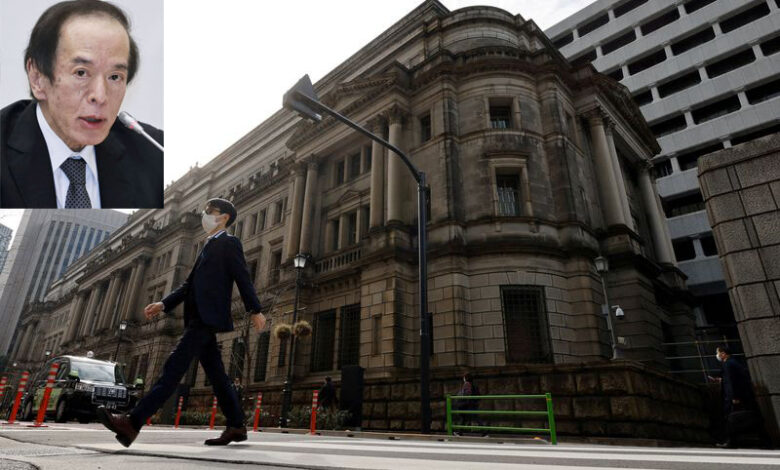Japan has appointed academic Ueda as the Bank of Japan’s next Governor.

TOKYO, 16 APRIL (Reuters) -The government of Japan chose academic Kazuo Ueda to be the next governor of the central bank. This was a surprise choice that could make it more likely that Japan’s unpopular yield control policy will end.
The current governor, Haruhiko Kuroda, whose second five-year term ends on April 8, will be replaced by Ueda, a 71-year-old former member of the Bank of Japan’s (BOJ) policy board. According to documents given to parliament on Tuesday, Ueda will take over from Kuroda.
The change in leadership marks the end of Kuroda’s 10-year monetary experiment, which was meant to shock the public out of a deflationary mindset. Eventually, it could help Japan move towards higher interest rates along with other major economies.
Since inflation is higher than the BOJ’s target of 2%, Ueda has the difficult job of getting the BOJ’s ultra-easy policy back to normal. This policy has been in place for a long time and has been getting more and more criticism from the public for changing how markets work and hurting bank margins.
Analysts think that Ueda, who has warned in the past about the dangers of raising interest rates too quickly, will wait to tighten monetary policy.
Analysts say that he may be more eager than his predecessor to get rid of yield curve control (YCC), a complicated system that combines negative short-term rates with a 0.5% bond yield cap. In the past, he has pointed out some of its possible flaws.
Naomi Muguruma, a senior market economist at Mitsubishi UFJ (NYSE: MUFG) and Morgan Stanley (NYSE: MS) Securities, said that Ueda is likely to base monetary policy on theory and analysis of the real world.
She said, “I don’t think he’ll just keep going with a policy that didn’t work and is causing more and more problems.”
Many investors were surprised by Ueda’s appointment, which was first reported by the Nikkei newspaper and confirmed by Reuters on Friday. They thought the job would go to an experienced central banker like deputy governor Masayoshi Amamiya.
Analysts say that if Ueda is in charge, it will be easier for the BOJ to stop the current stimulus than if Amamiya, who was a key part of making Kuroda’s policies, was in charge.
Izuru Kato, chief economist at Totan Research, said, “It’s possible that the BOJ will stop capping the yield on 10-year bonds this spring or summer.”
“Once it gets rid of the 10-year yield target, the BOJ could wait to decide when to get out of negative rates to see how inflation and economies in other countries change,” he said.
On Tuesday, the yen went up 0.46 percent to 131.82 per dollar, and the yield on a 10-year Japanese government bond (JGB) stayed above the 0.5% limit set by the BOJ. Even though investors think Ueda is less dovish than Amamiya, most of the market’s response to his nomination happened on Friday when news of it came out.
Recovery is fragile.
The choice of the next BOJ governor by Prime Minister Fumio Kishida has been closely watched by the international markets for clues about how soon the bank might stop using YCC.
The documents showed that the government also chose Ryozo Himino, who was the former head of Japan’s banking watchdog, and BOJ executive Shinichi Uchida to be deputy governors.
They will replace Amamiya and Masazumi Wakatabe, whose five-year terms end on March 19.
The nominations need to be approved by both chambers of the Diet, which is pretty much a done deal since the ruling coalition has strong majorities in both chambers.
Later this month, the nominees will have confirmation hearings, but the dates have not been set in stone.
If the parliament agrees, Ueda will lead his first BOJ meeting on policy on April 27 and 28.
Chief Cabinet Secretary Hirokazu Matsuno said on Tuesday that Ueda was a “well-known economist internationally” and that he hoped the BOJ would work closely with the government to help the economy grow.
Ueda told reporters near his home in Tokyo that he will “do his best” if the Diet agrees to the appointment.
People think of Ueda as a pragmatic academic who can change his mind about monetary policy. He has a PhD from the Massachusetts Institute of Technology and speaks in a soft voice.
He will be in charge of the BOJ at a time when inflation is twice as high as the central bank’s goal. This has given investors a reason to attack the 0.5% cap on the yield on 10-year bonds.
In July of last year, Ueda wrote an opinion piece for the Nikkei newspaper in which he warned against raising interest rates too soon in response to inflation that was mostly caused by cost-push factors.
But he also said that the BOJ should think about how to end its ultra-loose policy, pointing out how hard it is to keep the yield cap in place when inflation picks up.
Some analysts say that Japan’s weak recovery will make it harder to get out of the crisis. This is because data from October to December showed that growth rebounded less than expected.
Takeshi Minami, chief economist at the Norinchukin Research Institute, said that it might be hard for the BOJ to change its ultra-easy policy this year because economies in other countries are slowing down. “The BOJ might have to wait until at least fiscal 2024.”





